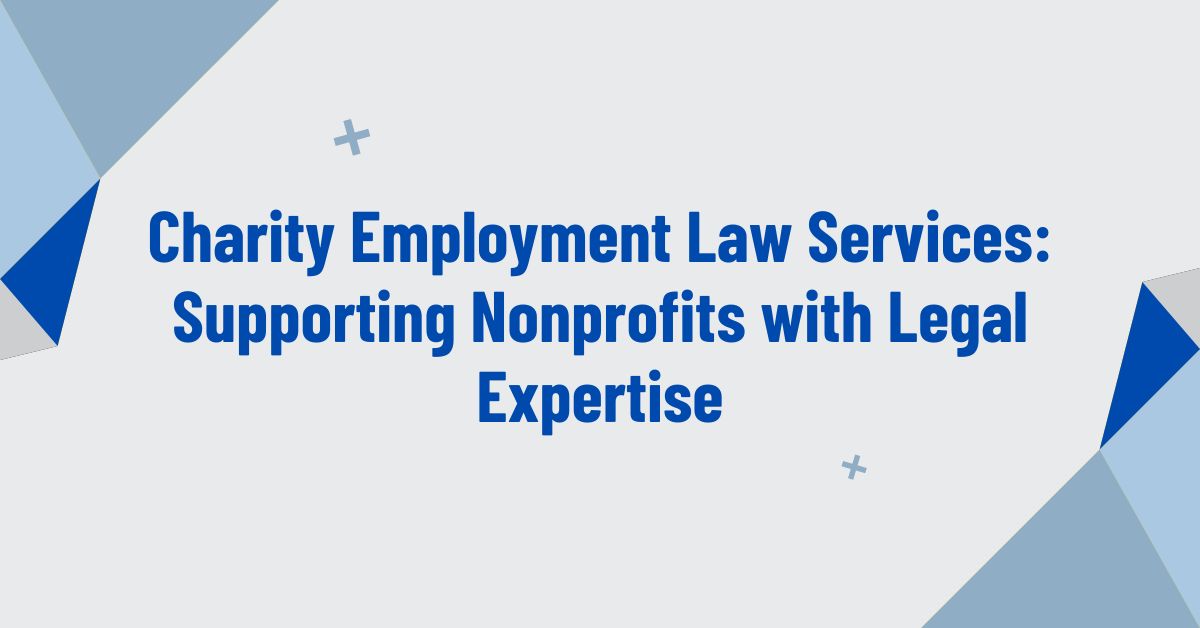Navigating legal matters can be a significant challenge for nonprofit organizations, including public charities and private foundations. Charity Employment Law Services offers essential legal support that helps organizations comply with federal tax laws and governance requirements.
This article discusses the importance of legal guidance for nonprofits and the types of assistance available, like consultation and representation.
Key Takeaways
What are Charity Employment Law Services?

Charity Employment Law Services offer crucial legal support for nonprofits, helping them handle complex compliance and governance issues. Nonprofit organizations, such as public charities and private foundations, need specialized legal advice to meet their specific needs and follow the rules that help them keep their tax-exempt status while navigating partnerships with philanthropic organizations.
These services allow nonprofits to meet legal obligations while focusing on their mission of charitable work and community advocacy, including initiatives led by advocacy organizations and social entrepreneurs.
How Do These Services Help Nonprofits?
Charity Employment Law Services play a crucial role in assisting nonprofits, including advocacy organizations and community foundations, manage legal obligations and comply with regulations.
These specialized services assist in understanding labor laws, employee rights, and workplace rules that affect nonprofits. Nonprofits often face specific legal challenges, such as complying with federal and state employment laws, managing volunteer relationships, and addressing workplace discrimination and harassment.
Legal counsel provides solutions such as creating detailed employee handbooks, conducting compliance training, and providing guidance on audits or external reviews, ensuring adherence to federal tax laws and compliance with IRS standards.
For instance, nonprofits may struggle with correctly classifying workers, risking costly penalties. By using legal expertise, these organizations can reduce risks and focus on their mission, including engaging in successful partnerships and maintaining good governance.
Why is Legal Expertise Important for Nonprofits?

Legal expertise is essential for nonprofits to navigate federal laws and regulations, ensuring compliance and good governance practices, thereby safeguarding their federal tax-exempt status.
What Types of Legal Issues do Nonprofits Face?
Nonprofits often deal with numerous legal issues, such as following state and federal regulations, governance conflicts, and employment law challenges. They must handle complex tax compliance to keep their tax-exempt status, with significant penalties if not followed correctly.
Employment disputes, like wrongful termination or discrimination claims, can use up resources and distract from their mission. Regulatory challenges such as fundraising and reporting requirements need a clear understanding of relevant laws.
Legal counsel is crucial in managing these issues by offering guidance on best practices, helping to create clear employment policies, and ensuring compliance with state fundraising laws.
For example, when a nonprofit undergoes an audit or inquiry from the IRS, experienced legal advisors can assist in responding effectively and maintaining the organization's standing.
What are the Consequences of Not Having Legal Expertise?
Failing to consult legal experts can lead to serious consequences for nonprofits, including losing tax-exempt status, facing expensive legal battles, and damaging their reputation.
One example illustrates how a nonprofit could lose its tax-exempt status after failing to follow proper reporting procedures, resulting in a significant loss of funding and public trust.
These examples show why proactive legal advice is crucial for nonprofits.
What Services are Offered by Charity Employment Law Services?

Charity Employment Law Services provide a complete set of services designed for nonprofits, including legal advice, consultation, and representation in legal issues.
Legal Advice and Consultation
Charity Employment Law Services offers legal advice and consultations to help nonprofits navigate complex legal issues. In a world of changing federal regulations, personalized legal guidance is vital for nonprofits to stay compliant and understand important governance practices for effective management.
Focusing on employment law helps nonprofits manage employee relations confidently, reducing the risks of labor disputes and staff turnover. By emphasizing this specialized knowledge, nonprofits can identify and avoid common legal issues, ensuring their mission and resources are protected for the communities they serve.
Contract Review and Negotiation
Contract review and negotiation are crucial for nonprofits to ensure that all agreements are legally sound and meet their goals. This includes reviewing the terms and conditions of various contracts that can significantly impact the organization's mission and sustainability.
For example, partnership agreements can create important collaborations but also bring complexities related to shared responsibilities and resource allocation. Service contracts for event sponsorship or consultant services need careful examination to avoid unexpected liabilities.
By thoroughly reviewing contracts, nonprofits protect their interests and build beneficial relationships, allowing them to focus confidently on their core mission.
Representation in Legal Proceedings
Charity Employment Law Services also provides legal representation for nonprofits during disputes or litigation. Nonprofits today may face challenges that require professional legal support, such as lawsuits from employees or others, government regulatory scrutiny, and contractual disputes, all of which can strain resources.
Knowledgeable legal advocates help manage these situations effectively, protecting the nonprofit's rights and interests. With expert guidance, organizations can remain focused on their mission, assured they are prepared to handle any legal challenges.
How Can Nonprofits Access These Services?

Nonprofits can reach Charity Employment Law Services through direct consultations, referrals from other nonprofits, or partnerships with legal organizations, ensuring they can access legal solutions tailored to their needs.
Are There Eligibility Requirements?
Eligibility for Charity Employment Law Services depends on the organization's status, size, and specific legal needs. Nonprofits should show their dedication to charitable purposes, have proper governance structures, and provide clear financial records.
During the assessment, they may need to submit documents such as their bylaws, latest financial statements, and tax-exempt status confirmation from the IRS. Organizations should be ready to detail their employee policies, current contracts, and any past legal issues impacting their situation.
These steps ensure services are customized to meet nonprofits' unique challenges.
What is the Cost of These Services?
Service costs depend on the complexity of legal issues and the nonprofit's size. Typically, hourly rates range from $150 to $500, depending on the attorney's experience and local market rates. Some may prefer flat fees for specific services, offering predictable costs.
Nonprofits with budget constraints should explore funding options, such as grants designated for legal assistance or using donor-advised funds to cover legal expenses.
What are the Benefits of Using Charity Employment Law Services?
Using Charity Employment Law Services benefits nonprofits by providing legal expertise that ensures compliance with complex regulations and reduces legal risks.
Expertise in Nonprofit-Specific Laws and Regulations
A key benefit of using Charity Employment Law Services is access to expertise in nonprofit-specific laws and regulations. This specialized knowledge is vital for organizations aiming to maintain their tax-exempt status as they navigate complex federal and state rules.
Legal counsel experienced in nonprofit law can help ensure compliance with employment laws related to worker rights, benefits, and workplace safety. Having a knowledgeable legal partner allows organizations to address potential compliance issues proactively and prevents costly legal disputes.
By understanding these requirements, nonprofits can focus more on their mission, promote growth and sustainability, and reduce legal risks.
Customized and Tailored Legal Solutions
Charity Employment Law Services offer customized legal solutions for nonprofits. Nonprofit organizations, such as public charities and private foundations, face unique challenges like complex employment regulations and funding limitations.
These legal services work closely with organizations to understand their specific goals and create legal strategies that are compliant and aligned with their missions. The process includes thorough consultations to identify legal risks and operational challenges.
Legal advisors develop personalized plans that adapt as organizations grow. This tailored approach reduces legal risks and allows nonprofits to focus more on their core activities, creating a greater impact on their communities.
Protection and Mitigation of Legal Risks in Nonprofit Organizations
Charity Employment Law Services help nonprofits protect themselves from legal risks while improving governance and compliance practices. These legal services enable organizations to understand the complex legal environment they operate in.
Nonprofits can establish strong compliance and risk management frameworks. They can create detailed volunteer and employee handbooks that outline policies on conduct, anti-discrimination, and grievance procedures to protect their tax-exempt status.
Legal advisors assist in drafting contracts that clearly define roles and responsibilities, minimizing misunderstandings that could lead to disputes. Successful nonprofits also conduct regular training sessions on legal obligations and risk management strategies to promote transparency and accountability.
Preparing to Work with Charity Employment Law Services

To maximize the benefits of working with Charity Employment Law Services, nonprofits should prepare by collecting all required documents and outlining their legal and organizational needs while considering federal laws.
Gather Necessary Documents and Information
Gathering necessary documents and information is an important first step for nonprofits working with Charity Employment Law Services. Having organized paperwork leads to a more productive consultation with legal experts and ensures that all legal and operational aspects are covered.
Nonprofits should compile key documents such as:
It is also helpful to include:
This preparation improves the efficiency of discussions and helps organizations proactively address potential legal challenges.
Identify Specific Legal Issues and Concerns
Identifying specific legal issues is crucial for nonprofits to effectively communicate with Charity Employment Law Services. Considering challenges related to compliance, governance, or employment helps organizations understand their unique situations better.
This understanding significantly enhances the ability of legal counsel to provide focused and effective support. By clearly stating their legal concerns, nonprofits can have more productive discussions with their attorneys.
This proactive approach, often facilitated by organizations like Tails of Hope, leads to better outcomes and reduces the risk of future legal problems.
Establish Communication and Expectations
Clear communication and expectations are crucial for a successful partnership between nonprofits and charity employment law services. This crucial step creates a solid foundation for success!
It ensures everyone understands the services to be provided, timelines, and specific outcomes expected during the engagement. Nonprofits should realize that open dialogue fosters trust and reduces potential misunderstandings during the legal process.
By maintaining ongoing communication, organizations can adapt to changes or challenges, ensuring legal support from firms like Davis Wright Tremaine remains effective in meeting their needs. Regular check-ins and updates reassure both parties that they are working toward a common goal.
Frequently Asked Questions
What types of legal services do charity employment law services provide for nonprofits?
Charity employment law services specialize in providing legal support for nonprofits in areas such as agreements between employers and employees, workplace policies, discrimination and harassment claims, and labor law compliance. These services are essential for maintaining compliance with federal tax laws and IRS regulations.
Why is it important for nonprofits to seek legal expertise for employment matters?
Nonprofits are subject to the same employment laws as for-profit businesses. Failing to comply can result in costly legal consequences, so seeking legal expertise ensures nonprofits operate within the law and protect their employees' rights.
How can charity employment law services assist with creating fair and equitable workplace policies?
Charity employment law services can review and revise current workplace policies to ensure compliance with state and federal laws. This promotes a fair and inclusive work environment for employees of all backgrounds.
What should nonprofits do if they are facing a discrimination or harassment claim from an employee?
If a nonprofit is facing a discrimination or harassment claim from an employee, they must seek legal expertise immediately to protect their interests and develop a plan for handling the situation effectively and fairly.
Do charity employment law services only assist with legal matters related to employees?
No, charity employment law services also provide legal support for other areas of a nonprofit's operations, such as intellectual property protection, contract negotiations, and compliance with tax laws and regulations.
Are charity employment law services only available to large nonprofits?
No, charity employment law services are available to nonprofits of all sizes. They can tailor their services to meet the specific needs and budget of each organization, providing valuable legal support regardless of size.

